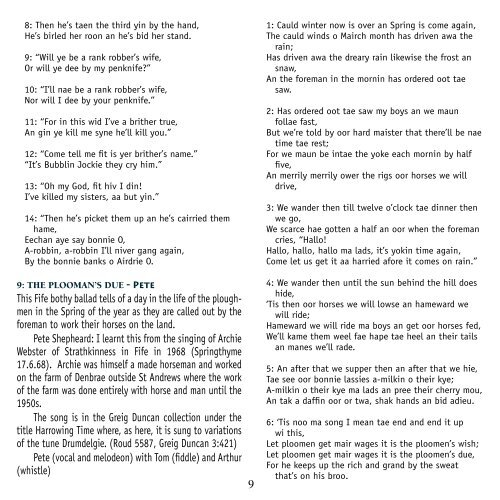watson - Springthyme
watson - Springthyme
watson - Springthyme
You also want an ePaper? Increase the reach of your titles
YUMPU automatically turns print PDFs into web optimized ePapers that Google loves.
8: Then he’s taen the third yin by the hand,<br />
He’s birled her roon an he’s bid her stand.<br />
9: “Will ye be a rank robber’s wife,<br />
Or will ye dee by my penknife?”<br />
10: “I’ll nae be a rank robber’s wife,<br />
Nor will I dee by your penknife.”<br />
11: “For in this wid I’ve a brither true,<br />
An gin ye kill me syne he’ll kill you.”<br />
12: “Come tell me fit is yer brither’s name.”<br />
“It’s Bubblin Jockie they cry him.”<br />
13: “Oh my God, fit hiv I din!<br />
I’ve killed my sisters, aa but yin.”<br />
14: “Then he’s picket them up an he’s cairried them<br />
hame,<br />
Eechan aye say bonnie O,<br />
A-robbin, a-robbin I’ll niver gang again,<br />
By the bonnie banks o Airdrie O.<br />
9: THE PLOOMAN’S DUE - Pete<br />
This Fife bothy ballad tells of a day in the life of the ploughmen<br />
in the Spring of the year as they are called out by the<br />
foreman to work their horses on the land.<br />
Pete Shepheard: I learnt this from the singing of Archie<br />
Webster of Strathkinness in Fife in 1968 (<strong>Springthyme</strong><br />
17.6.68). Archie was himself a made horseman and worked<br />
on the farm of Denbrae outside St Andrews where the work<br />
of the farm was done entirely with horse and man until the<br />
1950s.<br />
The song is in the Greig Duncan collection under the<br />
title Harrowing Time where, as here, it is sung to variations<br />
of the tune Drumdelgie. (Roud 5587, Greig Duncan 3:421)<br />
Pete (vocal and melodeon) with Tom (fiddle) and Arthur<br />
(whistle)<br />
9<br />
1: Cauld winter now is over an Spring is come again,<br />
The cauld winds o Mairch month has driven awa the<br />
rain;<br />
Has driven awa the dreary rain likewise the frost an<br />
snaw,<br />
An the foreman in the mornin has ordered oot tae<br />
saw.<br />
2: Has ordered oot tae saw my boys an we maun<br />
follae fast,<br />
But we’re told by oor hard maister that there’ll be nae<br />
time tae rest;<br />
For we maun be intae the yoke each mornin by half<br />
five,<br />
An merrily merrily ower the rigs oor horses we will<br />
drive,<br />
3: We wander then till twelve o’clock tae dinner then<br />
we go,<br />
We scarce hae gotten a half an oor when the foreman<br />
cries, “Hallo!<br />
Hallo, hallo, hallo ma lads, it’s yokin time again,<br />
Come let us get it aa harried afore it comes on rain.”<br />
4: We wander then until the sun behind the hill does<br />
hide,<br />
‘Tis then oor horses we will lowse an hameward we<br />
will ride;<br />
Hameward we will ride ma boys an get oor horses fed,<br />
We’ll kame them weel fae hape tae heel an their tails<br />
an manes we’ll rade.<br />
5: An after that we supper then an after that we hie,<br />
Tae see oor bonnie lassies a-milkin o their kye;<br />
A-milkin o their kye ma lads an pree their cherry mou,<br />
An tak a daffin oor or twa, shak hands an bid adieu.<br />
6: ‘Tis noo ma song I mean tae end and end it up<br />
wi this,<br />
Let ploomen get mair wages it is the ploomen’s wish;<br />
Let ploomen get mair wages it is the ploomen’s due,<br />
For he keeps up the rich and grand by the sweat<br />
that’s on his broo.


